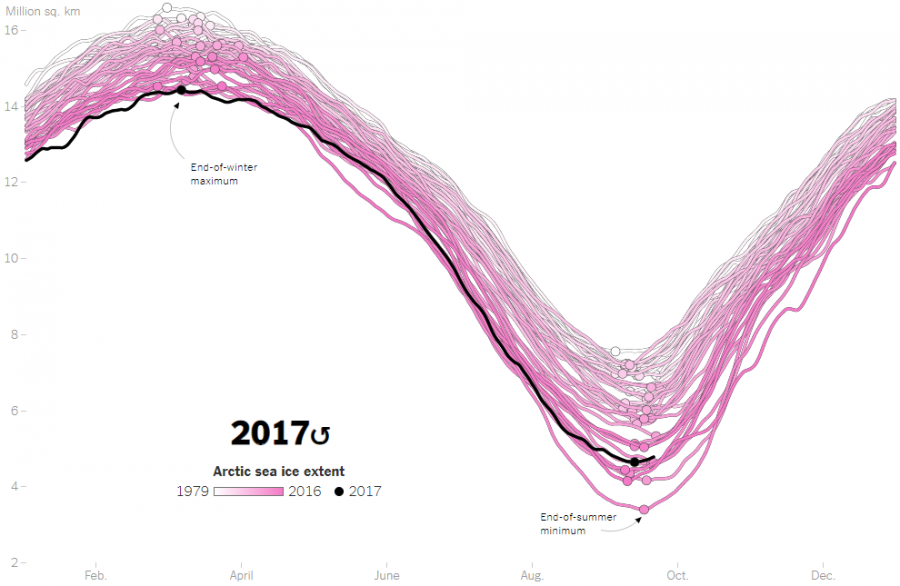Melting Poles Means Growing Cold for Georgia
What’s Causing the Georgia Cold?
Credit: NY Times (https://www.nytimes.com/interactive/2017/09/22/climate/arctic-sea-ice-shrinking-trend-watch.html?mcubz=1)
Dec 8, 2020
As climate change is being talked about more and more, some people are arguing that temperatures in America, especially the eastern coast, have been dropping, not rising. The sudden temperature drop in Georgia recently has further supported this argument.
However, this is no reason to dismiss climate change. The deceptive cold weather being experienced across the U.S is actually something much more worrying, a warning sign of our deteriorating Arctic sea ice. As global temperatures rise and melt the sea ice in the North Pole, the circling winds (called the polar vortex) become destabilized, bringing the southern states of the U.S cold air and colder winters. So, while the U.S gets a breath of relief (although some southerners accustomed to warmer temperatures might not call it that), the rest of the world is getting hotter.
To explain: a polar vortex is “a band of strong winds, high up in the atmosphere that keeps bitterly cold air locked around the Arctic region,” said theguardian.com. The polar vortex and Arctic sea ice are pretty closely intertwined. As sea ice waxes and wanes throughout the year, the polar vortex also experiences small dips into North America and Northern Europe. However, rising global temperatures are melting more sea ice, destabilizing the polar vortex.
Carbonbrief.org says that“[t]emperatures in the Arctic are rising at least twice as fast as the global average” and that “sea ice cover is diminishing by nearly four percent per decade.”
Ocean.si.edu also states that “…sea ice has been decreasing in extent and thickness. By 2040, Arctic sea ice may disappear altogether during summer months.”
How does this affect the polar vortex? Well, as sea ice melts, warm air from the ocean rises into the atmosphere. The warm air weakens the polar vortex, meaning that the circle of cold winds will be less tightly centered around the North pole, and will leak into the areas below.
Insideclimatenews.org puts it more eloquently: “The scientists think that the ocean energy that is being released is causing a weakening of the polar vortex winds over the Arctic, which normally keep cold air centered over the polar region. That weakening is then allowing cold polar air to slip southward more often.”
So far, it seems that a weakened polar vortex is the clear culprit of recent colder weather. However, scientists aren’t entirely sure of the effects of the polar vortex on North America. They know it has affected Northern Europe, as moments of instability in the vortex have been “coinciding with cold winters in Northern Europe and Russia,” but say that “the picture is not as clear for North America,” (insideclimatenews.org). This is because yearly variations in weather are making it hard to see an identifiable correlation/trend.
That being said, global warming has been linked to wider temperature shifts. NPR says that one effect of rising global temperatures is “temperature swings [getting] unusually extreme”. But, NPR also writes that certain climates hide or “[buffer] temperature swings”. These climates are hot, humid, tropical (or close to tropical) climates, which could apply to Georgia. NPR states that, “…different conditions affect temperature in different parts of the world. In the tropics, soil moisture plays a big role in moderating or “buffering” temperature swings.”
Facts seem to steer towards global warming and an unstable vortex causing colder temperatures in Georgia, but the complicated nature of the science makes it difficult to pinpoint an exact cause. However, one thing can be said for sure: bundle up, Georgia, it’s going to be a cold, long winter.










